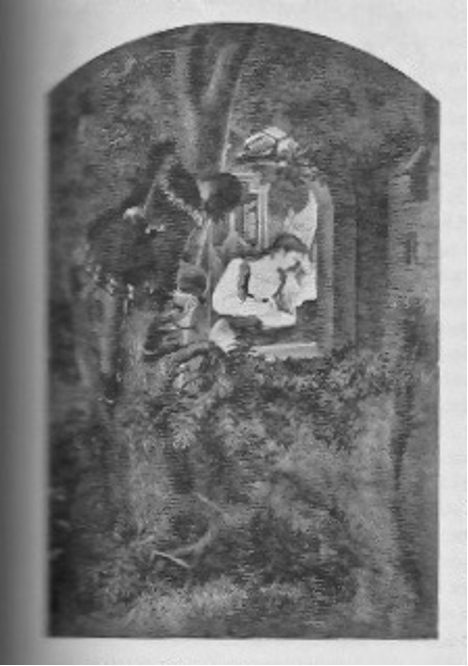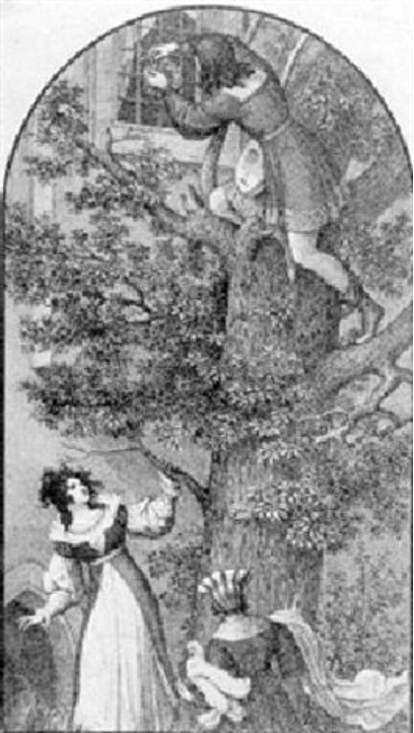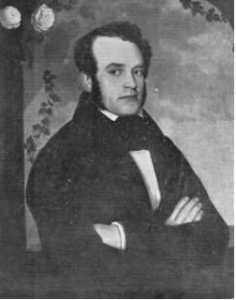What the young lady overheard about love
(Poet's title: Des Fräuleins Liebeslauschen)
Set by Schubert:
D 698
[September 1820]
Da unten steht ein Ritter
Im weißen Mondenstrahl,
Es tönet seine Zither
Von treuer Liebe Qual:
* * *
»Lüfte, spannt die blauen Schwingen
Still für meine Botschaft aus,
Ruft sie mit dem leisen Klingen
An dies Fensterchen heraus.
Sagt ihr, dass im Blätterdache
Seufze ein bekannter Laut,
Sagt ihr, dass noch Einer wache,
Und die Nacht sei kühl und traut;
Sagt ihr, wie der Mond so helle
Auf ihr Fenster streut sein Licht,
Sagt ihr, wie der Wald, die Quelle,
Heimlich und von Liebe spricht!!
Lass ihn leuchten durch die Bäume,
Deines Bildes süßen Schein,
Das sich hold in meine Träume
Und mein Wachen webet ein«.
* * *
Doch drang die zarte Weise
Wohl nicht zu ihrem Ohr,
Der Sänger schwang sich leise
Zum Fensterlein empor.
Und oben zog der Ritter
Ein Kränzchen aus der Brust;
Das band er fest am Gitter
Und seufzte: »Blüht in Lust!
Und fragt sie, wer euch brachte,
Dann Blumen tut ihr kun« –
Ein Stimmchen unten lachte:
»Dein Ritter Liebemund.«
Down there a knight is standing
In the white moonlight;
His zither resounds
With the agony of faithful love:
* * *
“Breezes, spread your blue wings
Quietly ready for my message,
With a soft ring call her
Out to this little window!
Tell her that under the roof of leaves
A familiar sound is sighing;
Tell her that there is another person who is awake
And that the night is cool and intimate
Tell her how bright the moon is
As it sheds its light on her window;
Tell her how both the woods and the spring
Are speaking secretly and about love!!
Through the trees let it shine –
The sweet glow of your image,
Which is woven beautifully into my dreams
And my waking hours!”
* * *
But the tender tune
Failed to reach her ear:
The singer gently swung himself
Up to the little window.
And up there the knight pulled
A little garland from his chest,
Which he tied firmly to the railings
And sighed, “Blossom in delight –
And if she asks who brought you,
Then, flowers, let her know – ”
A small voice down below laughed:
“Your knight Love-mouth!” –
All translations into English that appear on this website, unless otherwise stated, are by Malcolm Wren. You are free to use them on condition that you acknowledge Malcolm Wren as the translator and schubertsong.uk as the source. Unless otherwise stated, the comments and essays that appear after the texts and translations are by Malcolm Wren and are © Copyright.
☙
Themes and images in this text:
Blue Dreams Flowers Knights Mouths Night and the moon Serenades and songs at evening Springs, sources and fountains Sweetness White Wind Windows Wings Woods – large woods and forests (Wald) Wreaths and garlands Zithers

In early 1820 Franz von Schlechta attended an exhibition of paintings in Vienna, where he saw a picture by Ludwig Schnorr von Carolsfeld (1788-1853) which depicted a knight spying on a young woman through a window as she wrote a letter. This painting (which is only now known from an early copy) was entitled Des ritterlichen Jägers Liebeslauschen (What the knightly hunter overheard about love). Schlechta decided to write a poem based on this image:
Das Fräulein ist noch munter,
Und schreibt im Kämmerlein,
Und lächelt süß darunter;
Es muß viel Liebes seyn!
Die Gegend liegt in Träumen,
Der Mond allein ist wach,
Es wehen von den Bäumen
Die Blüthen in’s Gemach.
Das Briefchen ist geschrieben,
Gefaltet zart und glatt –
Sie seufzt: »Wer bringt dem Lieben
Wer bringt ihm nun dieß Blatt?«
Da klingen holde Töne
Aus lauer Nacht herein:
»Vertraue mir, du Schöne,
Ich will dein Bote seyn!«
Ob er es weit getragen,
Und wer darum gefleht,
Mögt ihr den Ritter fragen,
Der in den Zweigen steht.
The young lady is still up and about
Writing in her little room,
And she is smiling sweetly all the time;
There must be a lot of love there!
The neighbourhood is asleep and dreaming,
Only the moon is awake,
Blowing from the trees,
The blossom comes into the room.
The little letter has been written,
Folded up tenderly and smoothly –
She sighs, “Who is going to take it to the beloved,
Who is now going to take him this sheet of paper?”
Then beauteous notes ring
Out from the mild night:
“Trust me, oh beauty,
I will be your messenger!”
Whether he took it far,
And who it was that begged for it,
You will have to ask the knight
Who is standing in the branches.
Having completed this text, which presents the knight’s perspective from high up in the tree, Schlechta then appears to have decided to write a complementary narrative from the woman’s point of view, but this time with her standing underneath a tree as the knight attempts to tie a garland to the grill over her window. This is the poem (Des Fräuleins Liebeslauschen) which Schubert set to music (presumably from his friend Schlechta’s manuscript) in March 1820. In this case it is the girl who overhears (or eavesdrops on) the knight’s declaration of love.
Schlechta arranged to have both poems published as a pair in 1821 in the journal Converstationsblatt – Zeitschrift für wissenschaftliche Unterhaltung, the editor of which then asked the artist Schnorr von Carolsfeld to produce a lithograph illustrating the second text so that each poem could appear with an illustration. This picture illustrates the end of the story, as the knight is tying the garland to the window-grill and the young lady (accompanied by her chaperone) eavesdrops on his instructions to the flowers.

Schlechta’s poem states that the knight’s serenade was accompanied by a ‘Zitter’, which Schnorr von Carolsfeld seems to have interpreted to mean a sort of lute (cittern?) rather than a horizontally played zither. According to the poet, this instrument managed to express the ‘agony’ of faithful love, even though the words of the serenade itself (the middle section of the poem) do not seem to involve a great deal of pain. The knight simply instructs the breezes to tell the beloved to come to the window and recognise that nature is bursting with the love he feels. Interestingly, he does not declare it directly. He is only instructing messengers, first the breezes, and, after he has climbed the trees, the flowers. It is as if he is only comfortable speaking through intermediaries. This may well be the point of the lady’s sarcastic comment at the end. ‘Lord Love Mouth’ does not seem to have the courtesy to express his love directly in his own voice.
☙
Original Spelling and Note on the text
Des Fräuleins Liebeslauschen
Romanze.
Da unten steht ein Ritter
Im weißen Mondenstrahl;
Es tönet seine Zitter
Von treuer Liebe Qual:
* * *
»Lüfte spannt die blauen Schwingen
Still für meine Botschaft aus,
Ruft sie mit dem leisen Klingen
An dieß Fensterchen heraus!
Sagt ihr, daß im Blätterdache
Seufze ein bekannter Laut;
Sagt ihr, daß noch Einer wache
Und die Nacht sey kühl und traut
Sagt ihr, wie der Mond so helle
Auf ihr Fenster streut sein Licht;
Sagt ihr, wie der Wald, die Quelle
Heimlich und von Liebe spricht!!
Laß ihn leuchten durch die Bäume
Deines Bildes süßen Schein;
Das sich hold in meine Träume
Und mein Wachen webet ein! -«
* * *
Doch drang die zarte Weise
Wohl nicht zu ihrem Ohr;
Der Sänger schwang sich leise
Zum Fensterlein empor.
Und oben zog der Ritter
Ein Kränzchen aus der Brust,
Das band er fest am Gitter
Und seufzte: »Blüht in Lust -
Und fragt sie, wer euch brachte,
Dann Blumen thut ihr kund -«
Ein Stimmchen unten lachte:
»»Dein Ritter Liebemund!«« -
Schlechta tended to make minor changes to his poems each time they were published. The text which Schubert set later appeared in at least two other versions:
Das Fräulein
Hier unten steht ein Ritter
Im hellen Mondenstrahl,
Es tönet seine Zitter
Von treuer Liebe Qual:
»Lüfte spannt die blauen Schwingen
Sanft für meine Botschaft aus,
Rufet sie mit leisem Klingen
An dieß Fensterchen heraus.
Sagt ihr, daß im Blätterdache
Seufz' ein wohlbekannter Laut,
Sagt ihr, daß noch einer wache
Und die Nacht sey kühl und traut,
Sagt ihr wie des Mondes Welle
Sich an ihrem Fenster bricht,
Sagt ihr wie der Wald die Quelle,
Heimlich und von Liebe spricht!
Laß ihn leuchten durch die Bäume
Deines Bildes süßen Schein
Das sich hold in meine Träume
Und mein Wachen webet ein.«
Doch drang die zarte Weise
Wohl nicht zu ihrem Ohr,
Der Sänger schwang sich leise
Zum Fensterlein empor.
Und oben zog der Ritter
Ein Kränzchen aus der Brust,
Das band er fest am Gitter
Und seufzte: »Blüht in Lust!
Und fragt sie wer euch brachte,
Dann Blumen thut ihr kund:« -
Ein Stimmchen unten lachte:
»Dein Ritter Liebemund!«
* * *
Am Thurme lauschet ein Ritter,
Doch nicht in Erz und Stahl,
Er singt zum Spiel der Zither
Ein Lied von süßer Qual.
"Lüfte, rüttelt eure Schwingen,
Es gilt lieblichen Gewinn!
Denn ihr sollet Botschaft bringen
Wohl der schönsten Schläferin.
Sagt ihr, wie durch Duft und Stille
Hell das Lied der Amsel zieht,
Und die Nacht in Perlenfülle
Labung auf die Pfade sprüht;
Sagt ihr, wie des Mondes Welle
Sich an ihrem Fenster bricht,
Sagt ihr, wie so Bach als Quelle
Traulich mit den Blumen spricht!"
Kein Laut? es drang die Weise
Wohl nicht zum rechten Ohr,
Der Sänger schwang sich leise
Zum Fensterlein empor.
Und oben nahm der Ritter
Ein Sträußlein von der Brust,
Das band er fest am Gitter
Und seufzte: Blüht in Lust!
Und fragt sie, wer euch brachte,
Dann Blumen thut ihr kund -
Ein Stimmchen unten lachte:
Dein Schäfer Liebemund!
Confirmed by Peter Rastl with Conversationsblatt. Zeitschrift für wissenschaftliche Unterhaltung. Dritter Jahrgang. 1821. Erster Band. Wien. Im Verlage der Gerold’schen Buchhandlung. No. 1. Wien, Mittwoch den 3. Jänner, pages 7-8.
Note: This poem inspired a lithographic print by Ludwig Ferdinand Schnorr von Carolsfeld (reproduced in the source quoted above), which is a companion piece to his painting Des ritterlichen Jägers Liebeslauschen of 1818, which was also versified by Schlechta.
Note: Schlechta published this poem in a revised version with the title Das Fräulein as the second romance of Liebeslauschen. Zwey Romanzen in 1824. Later he created a further, substantially changed version, which was published posthumously in his Ephemeren.
To see an early edition of the text, go to page 7 [17 von 740] here: http://digital.onb.ac.at/OnbViewer/viewer.faces?doc=ABO_%2BZ167347805


